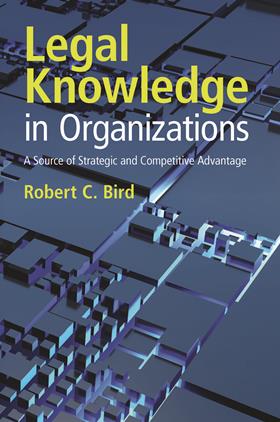Legal Knowledge in Organizations: A Source of Strategic and Competitive Advantage
Robert C. Bird
£95, Cambridge University Press
★★★★✩
Many businesses, especially those on a smaller scale, can often overlook a critically important aspect in business operations: the role of legal knowledge within organisational contexts. This book, whose author states that it took about two years to complete, reflects over 20 years of thought, research, and experience.
It adopts a multidisciplinary approach, exploring how legal information, the understanding of it, and the expertise can be applied to business decision-making and overall behaviour in organisations. This is a comprehensive and insightful examination of how law can influence corporate compliance, as well as strategic thinking and daily business management.

The writing style is unequivocal, despite putting forward complex legal concepts, allowing for a much broader audience to read, understand and put into practice. However, I found that the book will most likely be useful for professionals with a legal background, given the technical legal content.
The structure provides both theoretical foundations and practical insights. It begins with a thorough discussion of legal knowledge and how it is defined, while laying the groundwork for understanding why legal knowledge is crucial in any organisational setting. Legal knowledge and legal information are distinguished, while emphasising the importance of expertise in transforming raw data into actionable intelligence.
Case studies, practical examples and real-world applications explain how legal knowledge can be applied successfully, such as how an experienced lawyer can be a successful CEO. The author, however, suggests that a lack of legal understanding can lead to costly mistakes. A well-integrated legal knowledge system can help businesses mitigate risks and capitalise on various opportunities.
The book lacks an exploration of how the potential for legal knowledge can or may be misapplied or misunderstood in certain situations, especially by someone who may have a legal background but not enough experience or knowledge of its application.
I have yet to apply most of what I have learned into practice, though I look forward to using the roadmap provided by the author.
Zainab Zaeem is associate director/ solicitor at Summerfield Browne Solicitors, Leicester
Legal Knowledge in Organizations
★★★★✩
Are lawyers good for business? This book examines the role of lawyers in the business world and argues that legal knowledge and advice add a competitive advantage in the market. It makes sense for any commercial client to get the best advice in order to keep out of court, but can we go further than simply avoiding trouble?
The author argues that good advice is not only essential in the business world but a key to profitability. Lawyers should not just do the bare minimum to protect business clients from liability. They have an additional role as the supplier of conscience, morality and standards, in a way similar to the trusted adviser role lawyers perhaps once had.
It is an attractive argument for both professional and client, but I wonder if it is easier to theorise than put into practice. Business clients are mainly interested in profits for shareholders. This means avoiding claims and limiting liability. The public wants to buy from ethical traders who source products responsibly, do not exploit the people they deal with and look after their staff. Lawyers have a role to play in preparing and managing policies and procedures. Ethical and responsible businesses hopefully have less litigation and more profit.
This is an academic book written from an American perspective. The text is perhaps a little over-reliant on analysis of other academic studies and writers, but it comes to life when considering case studies which are relevant in the business world. These include workplace issues such as how sexual harassment is dealt with, intellectual property issues and anti-corruption policies. The author suggests there are various approaches to these legal issues such as:
- Avoidance – denying there is a problem or covering it up.
- Conformance – doing the bare minimum to get by.
- Prevention – doing more and actively tackling the issue before it becomes a problem.
- Value adding – which adds to competitiveness and therefore profitability.
- Transformation – changing the story.
The lawyer and client relationship is built on trust, integrity and openness. Perhaps there is more both can do to enhance this. After all, a good client is a profitable one.
In an increasingly challenging commercial world, this is a timely book.
David Pickup is a partner at Pickup & Scott Solicitors, Aylesbury































No comments yet